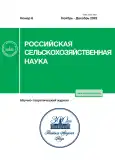Correlation analysis of the PRM1, STK35 and IFT27 level of expression genes with the quality of native and deposited seed of holsting bulls
- Authors: Barkova O.Y.1, Starikova D.A.1, Chistyakova I.V.1
-
Affiliations:
- Russian Research Institute of Farm Animal Genetics and Breeding - Branch of the L. K. Ernst Federal Research Center for Animal Husbandry
- Issue: No 6 (2023)
- Pages: 63-66
- Section: Articles
- URL: https://journal-vniispk.ru/2500-2627/article/view/233883
- DOI: https://doi.org/10.31857/S2500262723060133
- EDN: https://elibrary.ru/NIWFSR
- ID: 233883
Cite item
Full Text
Abstract
Keywords
About the authors
O. Yu Barkova
Russian Research Institute of Farm Animal Genetics and Breeding - Branch of the L. K. Ernst Federal Research Center for Animal Husbandry
Email: barkoffws@list.ru
196601, Pushkin, Moskovskoe sh., 55 A
D. A. Starikova
Russian Research Institute of Farm Animal Genetics and Breeding - Branch of the L. K. Ernst Federal Research Center for Animal Husbandry196601, Pushkin, Moskovskoe sh., 55 A
I. V. Chistyakova
Russian Research Institute of Farm Animal Genetics and Breeding - Branch of the L. K. Ernst Federal Research Center for Animal Husbandry196601, Pushkin, Moskovskoe sh., 55 A
References
- Recent advances in bovine sperm cryopreservation techniques with a focus on sperm post-thaw quality optimization / L. G. Grötter, L Cattaneo, P. E. Marini, et al. // Reprod Domest Anim. 2019. Vol 54. No. 4. P. 655-665. doi: 10.1111/rda.13409.
- Khan M. Z., Sathanawongs A., Zhang Y. Impact of сryopreservation on spermatozoa freeze-thawed traits and relevance OMICS to assess sperm cryo-tolerance in farm animals.// Front Vet Sci. 2021. Vol. 8. 609180. URL: https://www.frontiersin.org/articles/10.3389/fvets.2021.609180 (дата обращения: 14.09.2023). doi: 10.3389/fvets.2021.609180.
- The presence, role and clinical use of spermatozoal RNAs/ M. Jodar, S. Selvaraju, E. Sendler, et al. // Hum Reprod Update. 2013. Vol. 19. No. 6. P. 604-24. doi: 10.1093/humupd/dmt031.
- Integrated analysis of mRNAs and long noncoding RNAs in the semen from Holstein bulls with high and low sperm motility./ X. Wang, C.Yang, F. Guo, et al. // Sci Rep. 2019. Vol. 9. 2092. URL: https://www.nature.com/articles/s41598-018-38462-x (дата обращения: 14.09.2023). doi: 10.1038/s41598-018-38462-x.
- Transcriptome analysis of boar spermatozoa with different freezability using RNA-Seq. / L. Fraser, P. Brym, C. S. Pareek, et al// Theriogenology. 2020. Vol. 142. P. 400-413. doi: 10.1016/j.theriogenology.2019.11.001.
- Nucleotide variability of protamine genes influencing bull sperm motility variables / Y. M. H, S.Kumar, R.Chaudhary, et al. // Anim Reprod Sci. 2018. Vol. 193. P. 126-139. doi: 10.1016/j.anireprosci. 2018.04.060.
- Orchestrating the expression levels of sperm mRNAs reveals CCDC174 as an important determinant of semen quality and bull fertility / S. Selvaraju, D. Swathi, L. Ramya, et al. // Syst Biol Reprod Med. 2021. Vol.67. No.1. P. 89-101. doi: 10.1080/19396368.2020.1836286.
- The STK35 locus contributes to normal gametogenesis and encodes a lncRNA responsive to oxidative stress./ Y. Miyamoto, P.A.F. Whiley, H. Y. Goh, et al. // Biol Open. 2018. Vol. 7. No.8. P. 26-31. doi: 10.1242/bio.032631.
- Importin alpha mRNAs have distinct expression profiles during spermatogenesis / C. A. Hogarth, S. Calanni, D. A. Jans, et al. // Dev Dyn. 2006. Vol. 5. No.1. P. 253-262. doi: 10.1002/dvdy.20569.
- Intraflagellar transporter protein (IFT27), an IFT25 binding partner, is essential for male fertility and spermiogenesis in mice./ Y. Zhang, H. Liu, W. Li, et al // Dev Biol. 2017. Vol. 432. No. 1. P. 125-139. doi: 10.1016/j.ydbio.2017.09.023.
- Promoter polymorphisms in STK35 and IFT27 genes and their associations with boar sperm freezability / A. Mańkowska, P. Brym, P. Sobiech et al. // Theriogenology. 2022. Vol. 189. P. 199-208. doi: 10.1016/j.theriogenology.2022.06.023.
- Ficoll-400 density gradient method as an effective sperm preparation technique for assisted reproductive techniques / H. N. Highland, A. S. Rishika, S. S. Almira, et al // J Hum Reprod Sci. 2016. Vol. 9. No.3. P. 194-199. doi: 10.4103/0974-1208.192070.
- Livak K. J., Schmittgen T. D. Analysis of relative gene expression data Using realtime quantitative PCR and the 2(Delta DElta C(T)) method // Methods. 2001. Vol. 25. No. 4. P. 402-408. doi: 10.1006/meth.2001.1262.
Supplementary files









